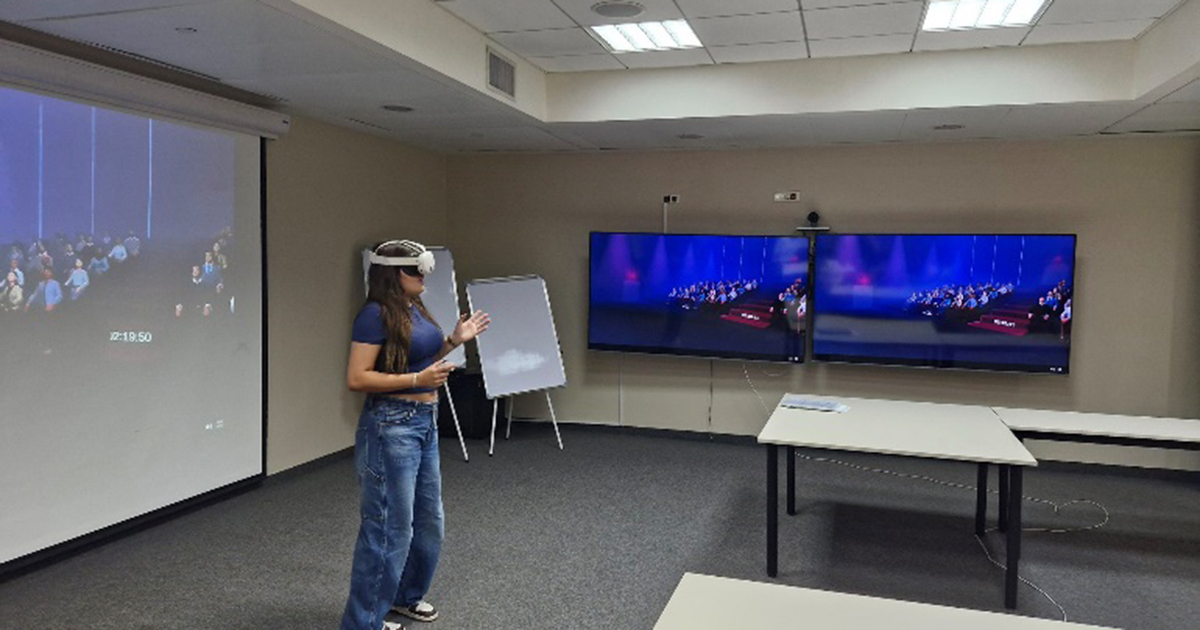AI Bridges Public Speaking and Technology at the SOE
The School of Engineering harnesses the power of AI and VR in helping students master technical communication with confidence.
When students in the GNE 301 Professional Communication course at the LAU School of Engineering (SOE) rehearsed their final presentation, they did not face a panel of professors or a classroom full of peers. Instead, they stood before a virtual audience, using a combination of artificial intelligence (AI) and virtual reality (VR) to simulate a real audience. Within seconds, an AI-generated question cut through the silence, prompting them to think on their feet.
The experience was part of a broader transformation taking place at the SOE, where technology is being used alongside faculty guidance to create new ways of teaching.
The initiative reflects LAU’s broader commitment to experiential, technology-driven education, explained SOE Dean Michel Khoury. “As AI and VR technologies become increasingly integrated into workplace communication and professional training, the university is ensuring that students graduate with both the technical expertise and the soft skills that employers and industry partners actively seek,” he added.
The tool, which combines AI and VR to enhance students’ public speaking preparation, was integrated into the course this summer to help improve students’ ability to communicate technical ideas, speak clearly and stay calm under pressure.
The system places students in virtual environments that feel like real presentation venues. With only a laptop and VR goggles allowing for remote and flexible practice options, students can rehearse presentations multiple times, with each session recorded and analyzed by AI. The tool evaluates eye contact, vocal tone, pacing, clarity and even the appropriateness of language, providing immediate feedback on performance.
“This is about using the latest technology and addressing a fundamental challenge in engineering education in realistic settings, while improving confidence and reducing anxiety,” said Associate Professor and Associate Dean Caesar Abi Shdid. “We are equipping our students with the tools they need to communicate their work effectively in professional and public settings.”
Beyond analysis, the AI tool also poses spontaneous, context-specific questions, encouraging students to deepen their engagement with the material and respond in real time, just as they would in a professional environment. Dr. Abi Shdid underscored that the tool’s immersive environment also plays a psychological role.
“The system allows students to practice on their terms, from anywhere, without the fear of being judged. It enables more authentic progress and encourages students to move beyond their comfort zones,” he said.
The students pointed out that their improvement was noticeable and had a direct impact on their confidence and delivery. “It was a fascinating experience,” said Alexander Masaad, a third-year mechanical engineering student. “The virtual audience was asking questions related to the content of our presentations and clapping. It was truly interactive and a good boost to our confidence.”
The performance data was analyzed over time, enabling targeted strategies for skill enhancement and generating reports. By the time they delivered their final presentations on July 16, the students were able to carry themselves on stage with ease and focus. “We presented and answered the questions to a virtual audience with increased motivation and retention,” said Nazih Hajj, a second-year computer science student.
The software also encouraged reflection, allowing the students to adapt their speaking strategies using detailed metrics and AI-generated feedback. This combination of hands-on coaching and smart digital tips allowed for a highly personalized learning experience.
“By harnessing the power of AI and VR, and bringing it to the classroom,” said Dr. Abi Shdid, “we are making our classes more engaging and interactive, ensuring our students’ intellectual and professional growth.”
